

SILICON VALLEY: Boom will turn to bust - Business Insider. Startup advice, briefly. This is a very short summary with lots left out—here is the long version: You should start with an idea, not a company.
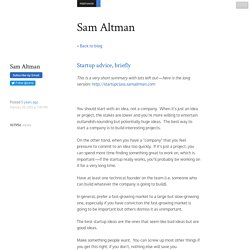
When it’s just an idea or project, the stakes are lower and you’re more willing to entertain outlandish-sounding but potentially huge ideas. The best way to start a company is to build interesting projects. On the other hand, when you have a “company” that you feel pressure to commit to an idea too quickly. If it’s just a project, you can spend more time finding something great to work on, which is important—if the startup really works, you’ll probably be working on it for a very long time.
Have at least one technical founder on the team (i.e. someone who can build whatever the company is going to build). In general, prefer a fast-growing market to a large but slow-growing one, especially if you have conviction the fast-growing market is going to be important but others dismiss it as unimportant. Make something people want. Become formidable. The most common mistake when forecasting growth for new products (and how to fix it) at. Forecasting weather is hard, and so is forecasting product growth.
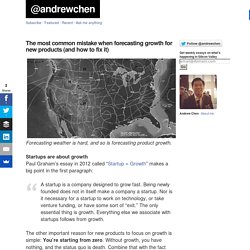
Startups are about growth Paul Graham’s essay in 2012 called “Startup = Growth” makes a big point in the first paragraph: A startup is a company designed to grow fast. Being newly founded does not in itself make a company a startup. Nor is it necessary for a startup to work on technology, or take venture funding, or have some sort of “exit.” The only essential thing is growth. The other important reason for new products to focus on growth is simple: You’re starting from zero.
Getting to this number while trying to show a hockey stick leads to a bad forecast. The bad forecast The most common mistake I see in product growth forecasts looks something like this: In this example, the number of active users is a lagging indicator, and if you multiply this lagging indicator of a growth curve, it’s a truism that the growth will go up and to the right. Finding Your Passion.
I graduated from college with a technical degree from one of the finest engineering schools in the world, I had helped to pay for college by writing code in a research lab, I had a strong academic record, and I had no clue what I wanted to do with my life.
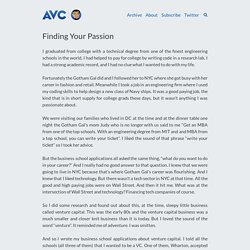
Fortunately the Gotham Gal did and I followed her to NYC where she got busy with her career in fashion and retail. Meanwhile I took a job in an engineering firm where I used my coding skills to help design a new class of Navy ships. It was a good paying job, the kind that is in short supply for college grads these days, but it wasn’t anything I was passionate about. We were visiting our families who lived in DC at the time and at the dinner table one night the Gotham Gal’s mom Judy who is no longer with us said to me “Get an MBA from one of the top schools. With an engineering degree from MIT and and MBA from a top school, you can write your ticket”. And so I wrote my business school applications about venture capital. Unicorns vs. Horses. Unicorns vs.
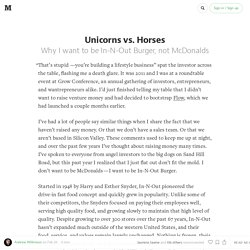
Horses Why I want to be In-N-Out Burger, not McDonalds “That’s stupid —you’re building a lifestyle business” spat the investor across the table, flashing me a death glare. It was 2011 and I was at a roundtable event at Grow Conference, an annual gathering of investors, entrepreneurs, and wantrepreneurs alike. I’d just finished telling my table that I didn’t want to raise venture money and had decided to bootstrap Flow, which we had launched a couple months earlier. I’ve had a lot of people say similar things when I share the fact that we haven’t raised any money. Started in 1948 by Harry and Esther Snyder, In-N-Out pioneered the drive-in fast food concept and quickly grew in popularity. My pal from Grow Conference wouldn’t like this one bit. The siren call for many entrepreneurs isn’t money, it’s freedom.
Venture funds know that the majority of start-ups will fail, so they need their portfolio companies to structure their deals like this in order to make a return. The Temptation of Data. There is nothing investors like more than data.
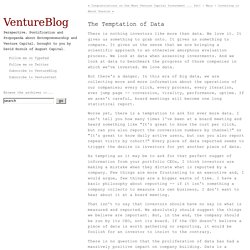
We love it. It gives us something to grab onto. It gives us something to compare. It gives us the sense that we are bringing a scientific approach to an otherwise amorphous evaluation process. We look at data when assessing investments. Notes on Leadership. [This blog post was originally published on TechCrunch on March 14, 2010.]
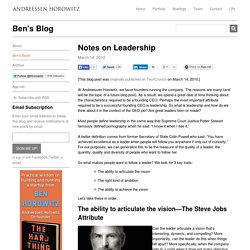
At Andreessen Horowitz, we favor founders running the company. The reasons are many (and will be the topic of a future blog post). As a result, we spend a great deal of time thinking about the characteristics required to be a founding CEO. Perhaps the most important attribute required to be a successful founding CEO is leadership. So what is leadership and how do we think about it in the context of the CEO job?